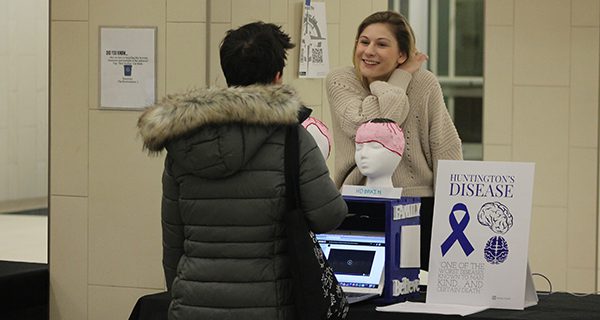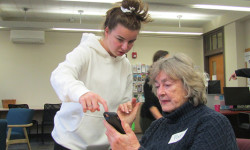[ccfic caption-text format="plaintext"]
By James Kinneen
Hometown Weekly Reporter
On Wednesday night, Wellesley high juniors and seniors that are part of the Evolutions program set up shop in the high school cafeteria to show off their Midstone projects, which they have been working on for half the year.
Essentially, Evolutions is a one-year program that allows Wellesley juniors and seniors the opportunity to work on a project they feel passionate about, as long as it’s something that is interdisciplinary and can be explained and shown off in a school setting. While the students will end the year with a capstone project, they were very excited to show off the projects they had worked on for so long.
“This is the time in the year where students have been learning a lot of skills from the first half of the year and then we let them loose and they get to pick a passion project or a topic they’re curious about,” explained teacher Thomas Henes. “They learn about it in depth, and then they figure out how to best share that with an audience. So, it’s really a way of giving them a lot of voice and choice over the content, but also the creation of it. It’s pretty incredible what they’re able to come up with in terms of what they find interesting and ways they can show it.”
The teachers didn’t put many parameters on what students could create or study, so there was an incredibly diverse range of things students worked on. For example, despite having no woodworking background, Emmett Lyne designed and built himself a ping-pong table from the ground up. Matt Gray, on the other hand, designed and showed off a couple of backgrounds he made for various old-school video game consoles (he didn’t make a full video game, because that would have taken too long). Others opted for more serious issues. Mikey Roberts studied teen vaping and its effects on young lungs, while Jake Gastwirt worked on the science behind opiate addiction and how it affects the brain.
But perhaps the two most interesting projects were Charles Dow’s work on starting a Wendy’s franchise, and Wedner Cadet’s work on concussions in football.
Dow had a fascinating backstory. His grandfather was friends with Dave Thomas and got into the business early. He ended up owning eighteen Wendy’s franchises and got family members involved when he started a firm to manage them. As a result, Dow had all sorts of information about Wendy’s that one might not be able to find on the internet.
But it was one myth he consistently debunked during the night: Wellesley isn’t allowed to have fast food. Consistently, someone would approach Dow with the myth that Wellesley wouldn’t allow the town to have a Wendy’s, and Dow would explain to them that it was not the case. Wellesley lack of fast food isn’t because it’s not allowed, it’s because the land required is too expensive for a fast food establishment to turn a profit.
“I called the town of Wellesley to see if I could build a Wendy’s and he was like: ‘I don’t see why not, but I’ll transfer you to someone in the zoning office.’ The zoning guy started chuckling and said ‘If you want to build a Wendy’s, you’re going to have to sell the hamburgers for ten dollars apiece, otherwise you’re not going to make any money, because the land is astronomically expensive.’”
Wedner Cadet was able to illustrate the changes in football helmets over the years by showing Wellesley football helmets from the 1920s to today. But, Cadet is a football player himself. Did the junior wide receiver scare himself away from football before his final season for the Raisers? When asked, if he was going to play next year, he laughed.
“Of course,” he said, motioning towards a modern-looking model of helmet. “I mean, it definitely scared me a lot, but I’m definitely going to get back on the field, especially because of this helmet right here - it’s going to keep me safe. Vicis is the most used and secure helmet in the NFL right now, so I definitely think that’s important - for parents to depend on what helmet they want their kid most protected in.”
Other interesting work included Luke Salerno’s remix of a Chance the Rapper song that he put on Soundcloud, as well as Ben West’s examination of Cambridge Analytica and how big data harnesses and uses your information with an emphasis on the regulations Europe has enacted (but the United States hasn’t).
While the students will begin new projects for their end-of-year projects, on Wednesday, they showed off what they learned. They told attendees about the dangerous effects of vaping, the addictive qualities of opioids - and that if the land is cheap enough, Wellesley can absolutely have a Wendy’s.























